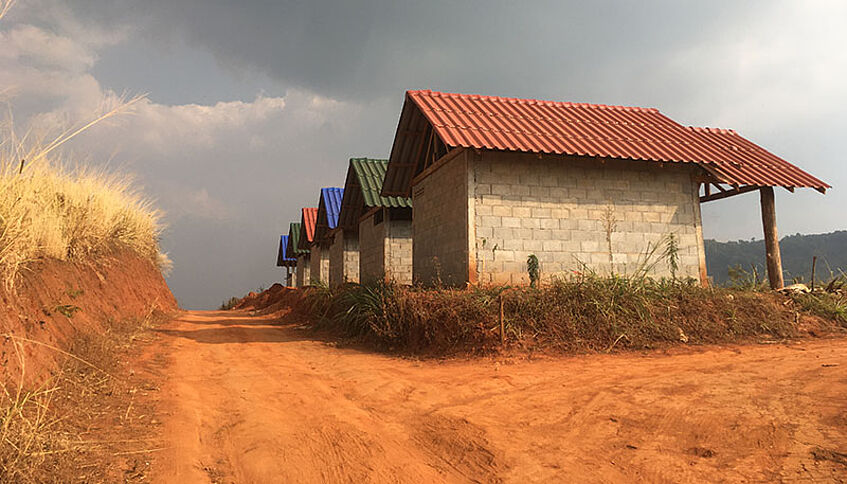
Newly built houses in Mae Chaem District, Northwest Thailand (Source: H. Sterly 2020)
HABITABLE – Linking Climate Change, Habitability and Social Tipping Points: Scenarios for Climate Migration
Principal Investigator: Patrick Sakdapolrak (IfGR, University of Vienna), with Marion Borderon, and Harald Sterly (both IfGR, University of Vienna)
Research collaborators: Université de Liège (BE), Potsdam Institut für Klimafolgenforschung (DE), The University of Exeter (UK), Stiftelsen Flyktninghjelpen (NO), Lunds Universitet (SE), Sapienza Università di Roma (IT), adelphi research gemeinnützige GmbH (DE), Université de Neuchâtel (CH), Institut de recherche pour le développement (FR), Council for Scientific and Industrial Research (ZA), UNESCO, University of Ghana (GH), CARE France (FR), Universiteit Twente (NL), Université Cheikh Anta Diop de Dakar (SN), Stockholm Environment Institute (SE), Raks Thai Foundation (TH), Addis Ababa University (ET), University of Khartoum (SD) and Institut National de la Statistique (ML)
Duration: 2020 - 2024
Funded by EU Horizon 2020
Background
The Population, Environment, Development Working Group at the Department of Geography and Regional Research led by Patrick Sakdapolrak is a key partner of HABITABLE (Linking Climate Change, Habitability and Social Tipping Points: Scenarios for Climate Migration), a flagship project on climate change and migration funded by the EC. HABITABLE is the largest research project on climate change and migration to have ever been funded by the EC’s Horizon 2020 programme. With a total budget of 6.8 million Euro, the HABITABLE project addresses the nexus between climate change, habitability and social tipping points and seeks to advance the understanding of how climate change does and will affect migration and displacement patterns. It is centred around the notion of habitability and will introduce the concept of social tipping points as an original way to analyse how environmental disruptions can potentially trigger major social changes.
Patrick Sakdapolrak, Marion Borderon and Harald Sterly from the Viennese working group will lead the activities of the work package on migration impacts and contribute to several other work packages. HABITABLE will be implemented by a diverse consortium associating 20 partners from different disciplines, coming from 17 countries across 3 continents. The consortium includes academic institutions, think tanks, NGOs and international organisations from Europe, West Africa, Southern Africa, East Africa and Southeast Asia. With its HABITABLE and AGRUMIG projects, the Viennese group is participating in the two key EU funded projects on migration, and is contributing its expertise on translocal resilience to a vibrant research community.
